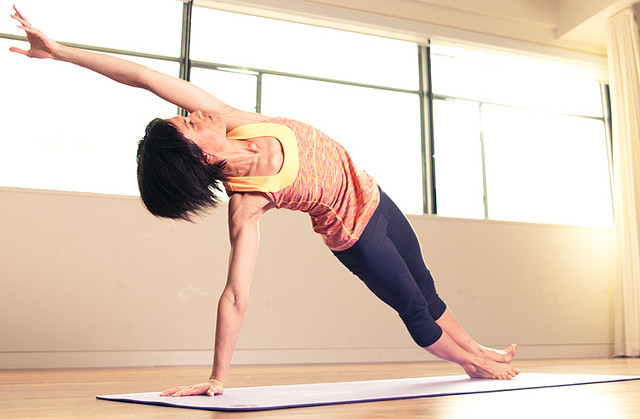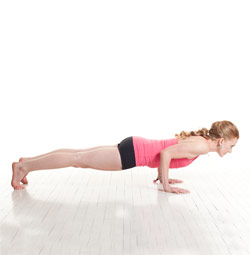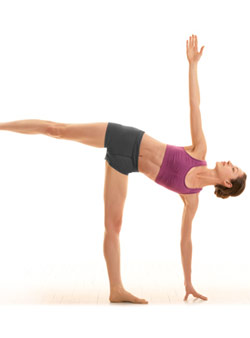A majority of sports injuries are caused due to lack of balance and excess strain on the lower back. Core strengthening yoga asanas can build muscles in and around the core, so that you can protect it from unnecessary strain.

Navasana (Boat pose)
- Come to sit on your mat.
- Bring the legs straight up to a 45 degree angle, coming into Boat Pose. The torso will naturally fall back, but do not let the spine collapse. For Beginners, bend your knees, bringing your shins parallel to the floor. This is called Half Boat. If this is tough to maintain, you can hold on to the backs of your thighs.
- Make a “V” shape with the body. Keep your back straight while doing this pose.
- Bring the arms out straight in line with the shoulders.
- Challenge Variation: Once you have established the pose, release the legs and torso simultaneously down towards the floor and hover there. Come back up into the pose like a sit-up. Do this as many times as you can.
Utkatasana (chair pose)
- Begin in Tadasana, arms down by your sides, sternum lifted.
- Squat deeply with your weight back onto your heels, squeezing your inner thighs together.
- Stretch your arms overhead, placing palms together. Keeping your palms together, inhale and bring your arms down to the middle of your chest in Prayer Pose.
- On an exhale, twist your torso to the right. This will place your left elbow at the outside of your right knee. Keep your arms in Prayer Pose.
- Inhale, then exhale while deepening the twist. Turn your eyes upward and hold the pose for three-to-five breaths.
- Slowly unwind your upper body to face forward as you exhale. .Straighten your legs, bring your palms back to Prayer Position, and return to Tadasana. Repeat on the other side.
Chaturanga Dandasana (Four-Limbed Staff Pose)
 Chaturanga is like a push-up, and as such is a great arm strengthener. It is part of the Sun Salutation vinyasa sequence of poses.
Chaturanga is like a push-up, and as such is a great arm strengthener. It is part of the Sun Salutation vinyasa sequence of poses.- From Plank position, bend the arms straight back, keeping the upper arms hugging into your sides.
- Lower down toward the floor, stopping when your forearms and upper arms are at a right angle.
- Keep the whole body very level.
- Push back into the heels.
- Roll over the toes coming into Upward Facing Dog.
Vasisthasana (Side Plank Pose)
- Get into the Adho Mukha Svanasana or Downward Facing Dog Pose. Place your right foot on top of your left foot. Place your hand on your hip and turn your body accordingly. You will now be supporting the weight of your body on your foot and hand on the left.
- Place the hand that supports your body a little ahead of your shoulders so that it is done in a slight angle from the floor. Keep your arm straight with the palm pressed firmly on the ground.
- Now tighten your thighs and apply weight on the floor through the heels of your legs. Your whole body is now in a diagonal alignment with the floor.
- You can also raise your right hand upward and remain in this balanced position for a while.
- Return to the Downward Facing Dog pose again and perform the same exercise on your right side.
Ardha Chandrasana (Half moon pose)
 Stand in Tadasana. Place a block on its short side against the wall. Inhale, spread your feet 1m (3.5ft) apart. Raise your arms to shoulder-level.
Stand in Tadasana. Place a block on its short side against the wall. Inhale, spread your feet 1m (3.5ft) apart. Raise your arms to shoulder-level.- Turn your right foot out to the right, parallel to the wall, and turn your left foot in, slightly to the right. Bend your right knee, and place the right palm on the block. Raise your left arm.
- Straighten your right leg. Raise your left leg, until it is parallel to the floor. Keep your left arm stretched up, in line with the right arm. The back of your left hand should touch the wall.
- Look up at your left thumb. Keep your weight on the right foot, thigh, and hip, not on your right palm. Hold the pose for 20 seconds. Repeat the pose on the other side.
Regular practice of these poses will improve your core strength and help flatten your abs. Strengthening your core can also help relieve back pain and improve your posture (nothing makes your belly look bigger than slouching!). Many of the poses recommended below are balances, which are a great way to work the core.
Related Links
Top 10 Reasons to Begin your Day with Surya Namaskar
Disclaimer
The Content is not intended to be a substitute for professional medical advice, diagnosis, or treatment. Always seek the advice of your physician or other qualified health provider with any questions you may have regarding a medical condition.

